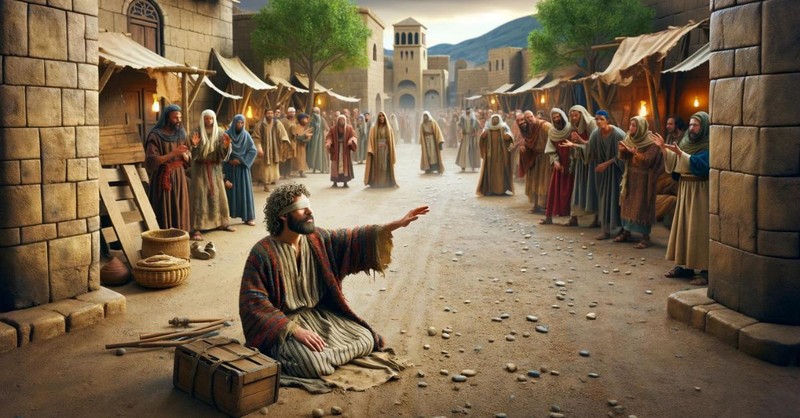
As I age, there are all sorts of things I’m noticing that never really stood out to me before. My eyesight, for example. For most of my life, my sight was fine. I didn’t have any difficulty reading things that were far away, nor did I have any problem reading small text, but in recent years, that has started to change.
I first noticed a subtle difference about two years ago. As I was reading, my sight seemed a little blurry. I thought I was just tired and needed to rub my eyes. That didn’t really solve anything and I observed a gradual progression of blurriness over time. Several people suggested I might want to consider buying a pair of reading glasses. I resisted that suggestion at first, but after trying them, I realized how helpful glasses were. Now I think I own about ten pairs, one for every location in my home or office where I’m likely to sit down and read. I even have a folding pair that’s attached to my keychain.
Sight, like many things in life, is one of those things you begin to appreciate particularly when it diminishes or goes away. I have known several people throughout the course of my life who could directly tell you what it’s like to navigate life with vision problems including partial sight and total blindness. Their stories are insightful.
On more than one occasion, the Bible also speaks of people who had experienced blindness. In many of the biblical narratives that address the subject, the condition of physical blindness is used to illustrate the deeper concern of spiritual blindness, and Mark 10:46-52 is one such example.
Photo Credit: Image created using DALL.E 2024 AI technology and subsequently edited and reviewed by our editorial team.
1. It Takes Bravery to Admit and Ask for Help.
In this passage, we’re told of a blind man named Bartimaeus. He was also someone who regularly begged people to show him compassion and help him financially. As he did so, he would often place himself in locations where groups of people would likely travel. Sometimes, he would beg for help along with other people who struggled with blindness. Matthew 20:30 tells us that there was another blind man begging with him, although that man’s name isn’t listed for us in Scripture. Mark 10:46 tells us Bartimaeus was sitting by the roadside as Jesus and His disciples passed by.
"And they came to Jericho. And as he was leaving Jericho with his disciples and a great crowd, Bartimaeus, a blind beggar, the son of Timaeus, was sitting by the roadside. And when he heard that it was Jesus of Nazareth, he began to cry out and say, 'Jesus, Son of David, have mercy on me!'” - Mark 10:46-47
Have you ever given thought to why, in certain circumstances, you’re willing to ask for the help you need while, in other circumstances, you’re hesitant to do so? Could it be because you’re fearful of receiving a negative response from others or being on the receiving end of a disdainful look from someone else? What if you couldn’t see the reactions on the faces of other people? Would that change what you were willing to do?
Bartimaeus couldn’t see the expressions on the faces of those around him. Their frowns or scowls weren’t visible to him, so when his ears heard that Jesus was about to pass his way, he unashamedly cried out for help. Over and over again he cried, “Jesus, Son of David, have mercy on me!”
2. Mercy Is a Powerful Ask.
What was Bartimaeus expressing in this plea for help? There are several important things conveyed in what he said.
In referring to Jesus as “Son of David,” Bartimaeus wasn’t confused. Maybe some of us reading that passage would wonder why Jesus wasn’t being referred to as the son of Joseph and Mary, or even the Son of God. Bartimaeus had something specific in mind as he used this designation.
The children of Israel knew from biblical prophecy that the day was coming when a descendant of King David would come and rule on David’s throne as the Messiah and Savior of the people. When Bartimaeus called Jesus, “Son of David,” he was expressing his sincere belief that Jesus was the Messiah, the fulfillment of those ancient prophesies.
Bartimaeus also asked Jesus to, “have mercy” on him. He sought Christ’s compassionate, merciful, and miraculous intervention in his life. When a person makes a plea for mercy, they’re asking to not be treated as harshly as their offenses deserve. Bartimaeus was essentially saying to Jesus, “I know I deserve punishment, and I know I deserve for you to walk right past me and ignore me, but would you be willing to heal me instead? Would you be willing to rescue me from blindness?”

3. Parting from the Crowd Takes Courage.
What did the people around Bartimaeus think of this request? Conversely, what did Jesus think about the words Bartimaeus spoke and the faith he expressed in this desperate plea?
"And many rebuked him, telling him to be silent. But he cried out all the more, 'Son of David, have mercy on me!' And Jesus stopped and said, 'Call him.' And they called the blind man, saying to him, 'Take heart. Get up; he is calling you.' And throwing off his cloak, he sprang up and came to Jesus." - Mark 10:48-50
The rebuke of the crowd didn’t silence Bartimaeus. In fact, he seemed prompted to cry out even more, and mercifully, Jesus noticed him, stopped walking, and called him unto Himself. Without hesitation, Bartimaeus responded to Christ’s invitation. Hastily, he threw off his cloak and came to Jesus as quickly as he could, most likely with the help of those around him.
There’s a lesson for us here that I hope we won’t miss. Do you ever feel hesitant to call out to Jesus because you’re embarrassed about your need, fearful of the reactions of others, or concerned that you’re too insignificant to catch His attention? It wouldn’t surprise me to learn that there may have been times when you’ve felt that way. I certainly have at different seasons of my life.
Photo Credit: Image created using DALL.E 2024 AI technology and subsequently edited and reviewed by our editorial team.
4. Christ Always Meets Us with Compassion.
Jesus demonstrates a form of compassion in this passage that should stand out to us. It’s a form of compassion that He’s shown humanity more times than we can count. Jesus delights to notice us and meet our deepest needs. He sees us in our blindness and calls us unto Himself.
"And Jesus said to him, 'What do you want me to do for you?' And the blind man said to him, 'Rabbi, let me recover my sight.”'And Jesus said to him, 'Go your way; your faith has made you well.”'And immediately he recovered his sight and followed him on the way." - Mark 10:51-52
The other day, I saw a video of a man who walked up to a homeless woman and told her that he was willing to get her whatever she needed. She just needed to be specific with her requests. She told him that she needed a tent, propane, shoes, and clothing. When he returned with those items, he also learned that she had a storage unit with her other belongings in it that she was about to lose because she owed approximately $450 in back rent to the leasing company, so the man went and paid the leasing company what she owed.

5. Tell God Exactly What You Need.
When Jesus addressed Bartimaeus, He asked him, “What do you want me to do for you?” Bartimaeus didn’t hold back his request. He asked to be able to see, and Jesus gave him what he asked for. Jesus also made a point to acknowledge the faith Bartimaeus displayed throughout this entire interaction. Jesus said to him, “Your faith has made you well.”
One of the major lessons Scripture repeatedly emphasizes is the fact that in order to see the most important things in life, we first need to exercise faith in the Lord. We need to trust Jesus for the things that cannot be naturally seen in order to experience the spiritual blessings experienced through a relationship with Him. Sadly, many people in this world choose to persist in spiritual blindness. Consider what Scripture reveals to us about this elsewhere…
Photo Credit: Image created using DALL.E 2024 AI technology and subsequently edited and reviewed by our editorial team.

6. Spiritual Blindness Is a Form of Pride that Leads to Destruction.
“Every plant that my heavenly Father has not planted will be rooted up. Let them alone; they are blind guides. And if the blind lead the blind, both will fall into a pit.” - Matthew 15:13-14
The Pharisees and other religious leaders who had cultural influence during Christ’s earthly ministry were very proud men. They thought they were better than others. Even though they had memorized large portions of Scripture, their hearts were hardened to its actual meaning. They didn’t understand that God’s word points us to Jesus, so they resisted Him, worked against Him, rejected His teaching, and led themselves and those who followed them to spiritual peril and eternal condemnation.
Photo Credit: Image created using Canva Pro AI technology and subsequently edited and reviewed by our editorial team.
7. Satan Actively Attempts to Blind People from Seeing the Light of the Gospel.
“And even if our gospel is veiled, it is veiled to those who are perishing. In their case the god of this world has blinded the minds of the unbelievers, to keep them from seeing the light of the gospel of the glory of Christ, who is the image of God.” - 2 Corinthians 4:3-4
Satan isn’t ambivalent to the gospel. He is actively attempting to keep people in a state of spiritual blindness so they won’t respond to the hope the gospel of Jesus Christ contains. This is a form of blindness Satan seeks to perpetuate among humanity, but in spite of Satan’s attempts, Jesus still delights to answer prayers for sight. As we pray on behalf of our unbelieving family and friends, the Holy Spirit, who joyfully points our hearts toward Jesus, opens the eyes of those who are spiritually lost and enables them to see Jesus, understand their need for Him, and trust Him to mercifully save them.
8. Jesus Makes a Point to Call Out the Spiritual Blindness that Persists in the Church.
“For you say, I am rich, I have prospered, and I need nothing, not realizing that you are wretched, pitiable, poor, blind, and naked.” - Rev. 3:17
When we think of the church, we don’t tend to associate it with spiritual blindness, but there’s something important we need to understand about the “visible church” and how it operates on this earth.
Jesus knows who truly believes in Him. Likewise, He knows who doesn’t. From the earliest days of the church, there have been people who operate within the visible fellowship who don’t actually believe in Him. That may have been the case in the church at Laodicea. They were known for being a “lukewarm” church that, in one respect, professed faith in Christ but, in other respects, seemed to place an abundance of faith in their material prosperity.
Living during our prosperous times, we are highly likely to demonstrate characteristics very much like the Laodicean church which is mentioned in the book of Revelation. Some would argue that references to that church were also meant to serve as a symbolic illustration of the spiritual peril that is present during our era of history, even within the church.
So let’s test ourselves. Are we convinced that we don’t have spiritual needs because our material or financial needs are met? Does our personal prosperity blind us to our spiritual bankruptcy? Could we be content in Jesus even if we were stripped of our wealth and property?
Please understand that if your heart cannot be content with Jesus alone, you may possess a lukewarm faith or maybe no faith at all.
The lessons we’re invited to learn from the gospel accounts of Bartimaeus’ interaction with Jesus are consequential. Bartimaeus trusted Jesus, received both physical and spiritual sight from Jesus, and then as it states in Mark 10:52, Bartimaeus “followed him.”
Jesus sees you right now. You need His merciful intervention in your life. By trusting in Him completely, He will grant you the ability to see what you cannot naturally see. When He opens your eyes, don’t turn back. Follow Him.
Originally published at Bible Study Headquarters. Used with permission.

Originally published Thursday, 30 May 2024.









